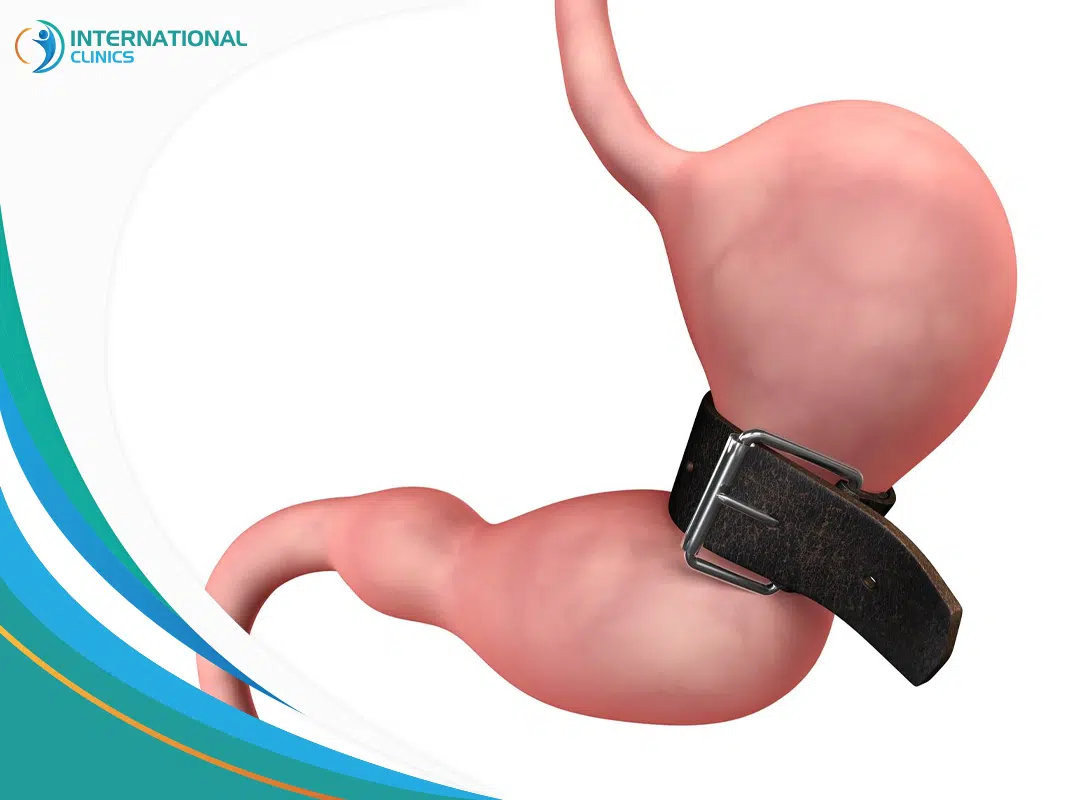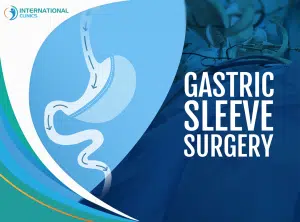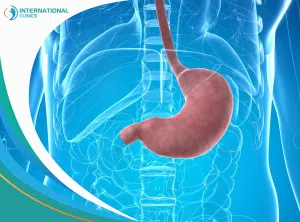Considering gastric sleeve surgery might be a very intimidating decision for many people. However, for those struggling with morbid obesity despite diet and exercise, it may offer so much hope.
Firstly, it’s important to understand how the procedure works. The surgeon removes about 80% of the stomach, transforming it from a large sac into a narrow tube. Of course, a smaller stomach can only hold much less food, which leads to a reduced calorie intake and rapid weight loss.
Secondly, compared to gastric bypass surgery, the gastric sleeve is a simpler procedure with fewer risks because it’s not a “gastrointestinal” surgery. Gastric bypass requires more complicated steps and may lead to nutrient absorption issues. The sleeve surgery, on the other hand, avoids this by solely reducing stomach size.
The gastric sleeve impacts hunger signals to the brain, often lessening appetite. The combination of restricted stomach capacity and reduced hunger means patients feel fuller and faster while eating less. Therefore, significant weight loss becomes achievable for many patients.
However, it’s not a quick fix for everything. To maintain results, lifestyle changes in diet and exercise are still essential.
In any case, bariatric sleeve surgery is now the most commonly performed weight loss surgery in the United States, the United Kingdom, and most other countries around the globe. Gastric sleeve in Turkey, for example, is a very common choice among those visiting the country.
In this comprehensive guide, we’ll inspect this surgery from all angles to give you a deep understanding of what the procedure could entail in 2024.
Save your time and get all the details in one click with your free consultation
Understanding Gastric Sleeve Surgery
Gastric sleeve surgery, also called sleeve gastrectomy or bariatric gastrectomy, helps people lose weight by reducing the size of their stomachs. Surgeons often remove about 90% of the stomach, leaving only a small banana-sized pouch to hold the food and liquid.
This automatically reduces the amount someone can eat and the calories consumed. Removing most of the stomach also decreases the production of ghrelin (hunger hormone). As a result, patients experience less hunger while feeling fuller and faster after eating only small amounts in the day.
The surgery is expected to positively impact metabolism and blood sugar control. With the combined effects of a tiny stomach, reduced appetite, and metabolic changes, many patients reach and maintain a healthier body weight after the procedure.
According to most bariatric surgeons and gastroenterologists, gastric sleeve surgery in Turkey is safer and simpler than operations that rearrange the intestines. The straightforward nature of the surgery adds to its popularity as a very effective and safe weight loss option.
For individuals struggling with obesity despite diet and exercise, gastric sleeve surgery may offer new hope for long-term health and well-being.
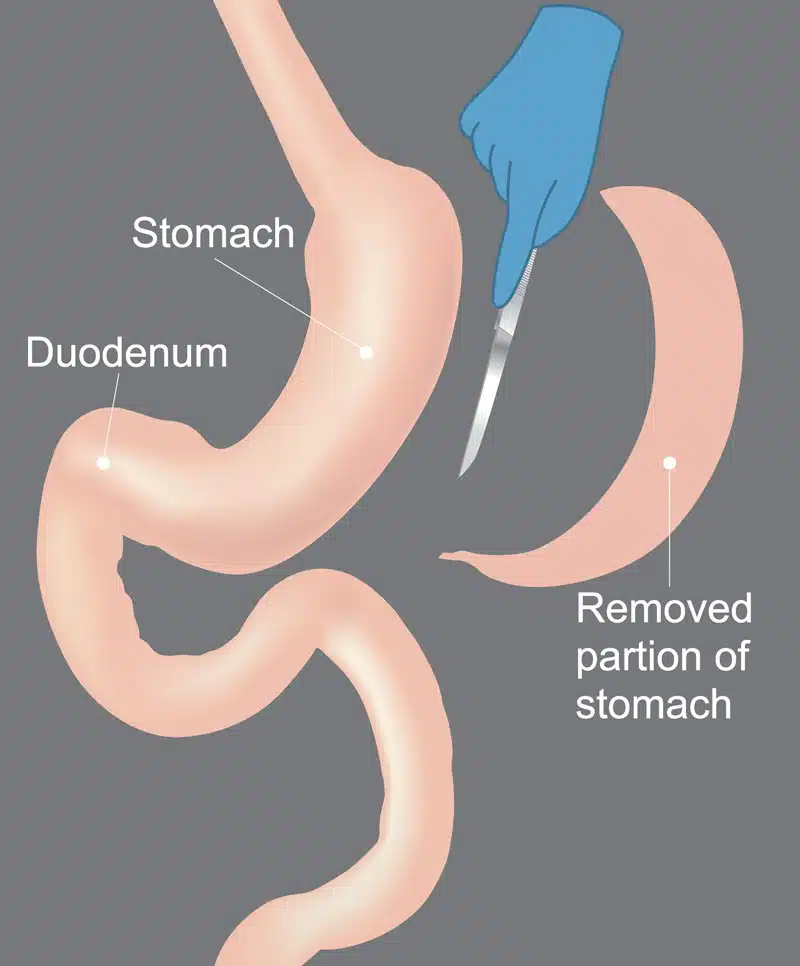
Who Is Gastric Sleeve Surgery For?
Gastric sleeve surgery can lead to significant weight loss while avoiding more drastic surgical alteration of digestion. For those seeking moderate weight reduction and relief from obesity-related illnesses, sleeve surgery offers an effective surgical option. In short, gastric sleeve surgery may be a good option if:
- Your weight loss goals are significant but not as extensive as those needing gastric bypass.
- You suffer from obesity-related conditions that impact your health and quality of life.
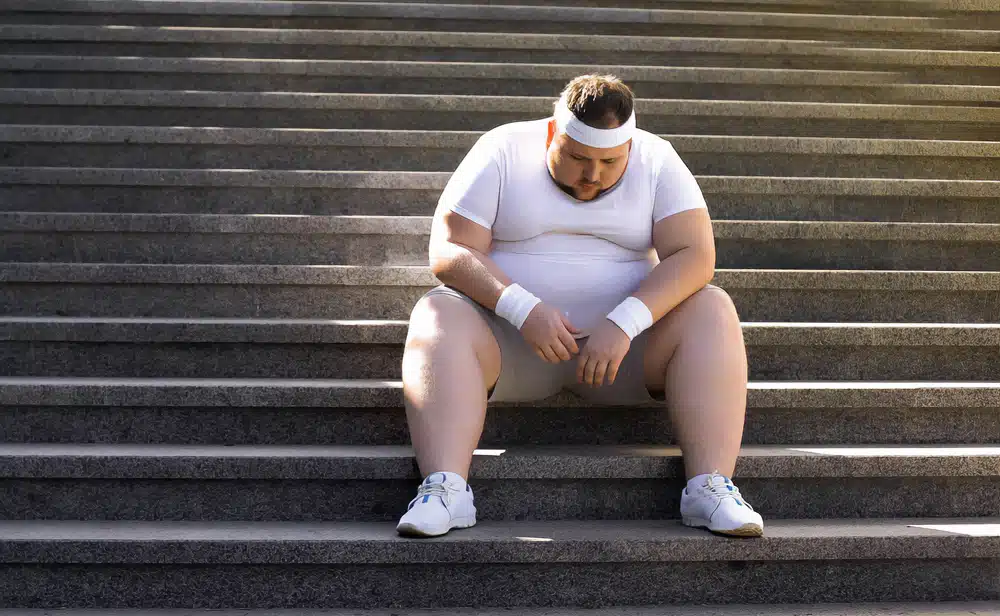
Stay safe and informed with expert advice from our specialized doctors. Contact us now!
Benefits & Potential Outcomes
Gastric sleeve is an effective weight loss surgery that can improve obesity-related conditions. Thanks to its benefits or advantages over other bariatric surgery options, many people prefer to have one, especially in the United States. The advantages of the procedure include:
- Gastric sleeve surgery can lead to significant weight loss, with patients losing 60% of their excess weight on average.
- Can improve obesity-related health conditions like Type 2 diabetes, sleep apnea, high blood pressure, fatty liver disease, and osteoarthritis.
- Doesn’t require implanting a foreign device in the body like gastric banding does.
- Can lead to a higher life expectancy, better health, and improved quality of life.
- The procedure takes less time than other weight loss surgeries.
- Can be performed on high-risk patients who may not be candidates for longer, more complex procedures.
- May be used as the first step before gastric bypass in severely obese patients.
- It’s generally safe to use anti-inflammatory medications after gastric sleeve.
- Has fewer side effects than more complex bypass surgery.

Preparing for Gastric Sleeve Surgery
Making major changes to your eating and exercise habits takes months of preparation before surgery. Following the guidance of the bariatric medical team will certainly help set you up for success.
Their specialized support throughout the process allows people to prepare physically and emotionally for the procedure and the lifestyle changes ahead. The preparation for stomach sleeve surgery may involve:
- Meet with doctors and surgeons to: Discuss what the surgery involves, get a preoperative evaluation, and learn about the required medications and potential complications.
- Consult with a dietitian to: Learn healthy eating basics like nutrition, regular meals, and portion sizes, understand the restricted diet required after surgery, and get guidance on what and how much you can eat post-operation.
- Work with an exercise specialist to: Create an enjoyable exercise program, develop workouts you can maintain, get in better physical shape prior to surgery for an easier recovery, and gradually ease back into exercise after surgery.
- See a psychologist to: Help process your emotions before and after surgery, develop coping strategies as your relationship with food changes, and address any emotional eating issues.

Need personalized medical advice? Contact us now.
The Gastric Sleeve Surgery Procedure
The entire surgery usually takes 1-2 hours. Afterward, you will wake up in a recovery room where medical staff will monitor you closely to observe any complications.
The small incisions allow for a minimally invasive procedure with a relatively quick recovery time. If done laparoscopically, the steps of the procedure include:
- You will be given general anesthesia, so you are asleep during the surgery.
- The surgeon will make a small, half-inch incision in your abdomen.
- They will insert a port and pump carbon dioxide gas into your abdomen to expand it.
- A small camera (laparoscope) will be inserted through the port to project a view of your organs onto a screen.
- 1-3 additional small incisions will be made to insert the surgical tools.
- The surgeon will measure and staple off a sleeve-shaped portion of the stomach.
- The rest of the stomach will be removed and the incisions will be closed.
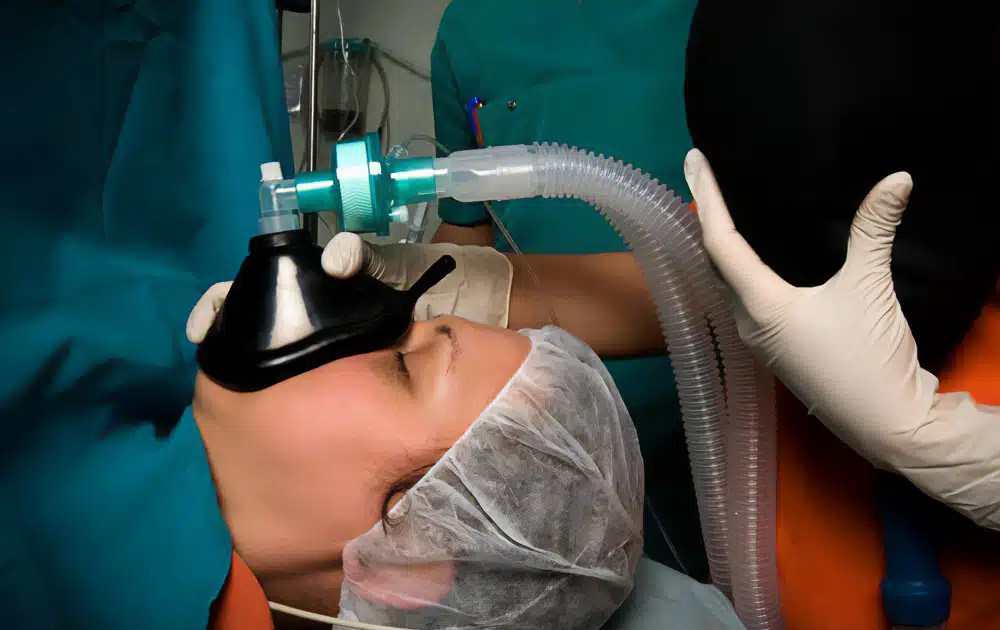
Recovery Process and Post-Operative Care
You may need to spend 1-3 days in the hospital after the procedure. Recovering from weight loss surgery requires changing your diet and eating habits over time. This allows your body to heal and adjust to your smaller stomach size.
Let your doctors guide you through each stage of dietary changes. Listen to your body, chew thoroughly, and take supplements as directed. Making long-term lifestyle adjustments will lead to the greatest success. You can expect the following during this period:
- For the first 1-2 weeks after surgery, you will only be able to consume liquids or very soft pureed foods. Your medical team will provide a schedule outlining when to progress to different textures of food. Go slowly and follow their guidance.
- After those initial weeks, you can gradually add in soft foods like mashed potatoes or scrambled eggs. Eventually, over the next several weeks, you can return to regular foods. However, your portions will need to stay very small, even with regular foods.
- Eat slowly, chew thoroughly, and listen to your body. Rushing back to regular foods too quickly can cause pain, nausea, and vomiting.
- As your stomach continues healing over the next several months, you will need to maintain long-term diet changes. Small, frequent meals will be necessary to avoid overfilling your smaller stomach pouch.
- In addition, you may need vitamin supplements since less food intake can lead to deficiencies. Your medical team will monitor this.
- Have regular blood tests in the year after surgery to check for anemia, high blood sugar, or low calcium/vitamin D. Your doctors may prescribe supplements or medications as needed.
- To avoid regaining weight over time, stick to healthy eating and exercise regularly. Joining a support group can help you maintain new habits.
- The stomach pouch may stretch out again over time, allowing more food intake. But consuming too much can still result in weight regain. Portion control remains essential.

Long-Term Effects and Lifestyle Changes
You may need support from your medical team and dietitian during recovery. Making lifelong diet and portion size changes is challenging but necessary after gastric sleeve surgery. Be patient with your body’s healing process.
You will typically recover from gastric sleeve surgery within 1 week. However, it takes several more weeks for your stomach and body to adjust before you can return to regular foods.
You need to know that gastric sleeve surgery permanently reduces the size of your stomach. For the rest of your life, you will feel full faster and will need to eat much smaller portions.
To allow your body to adapt, you will follow a gradual post-surgery diet under the guidance of a dietitian:
- For the first 2-3 weeks after surgery, your nutrition will come entirely from high-protein drinks as your stomach heals.
- Next, you will move to 2 weeks of pureed soft foods like mashed potatoes or apple sauce. This allows your stomach to tolerate more solid foods.
- After that, you will spend 2 more weeks on soft foods such as scrambled eggs or well-cooked vegetables. This continues the transition.
- Finally, after about 6-8 weeks total, you can return to regular foods. But your portions will remain very small compared to before surgery for better weight management.
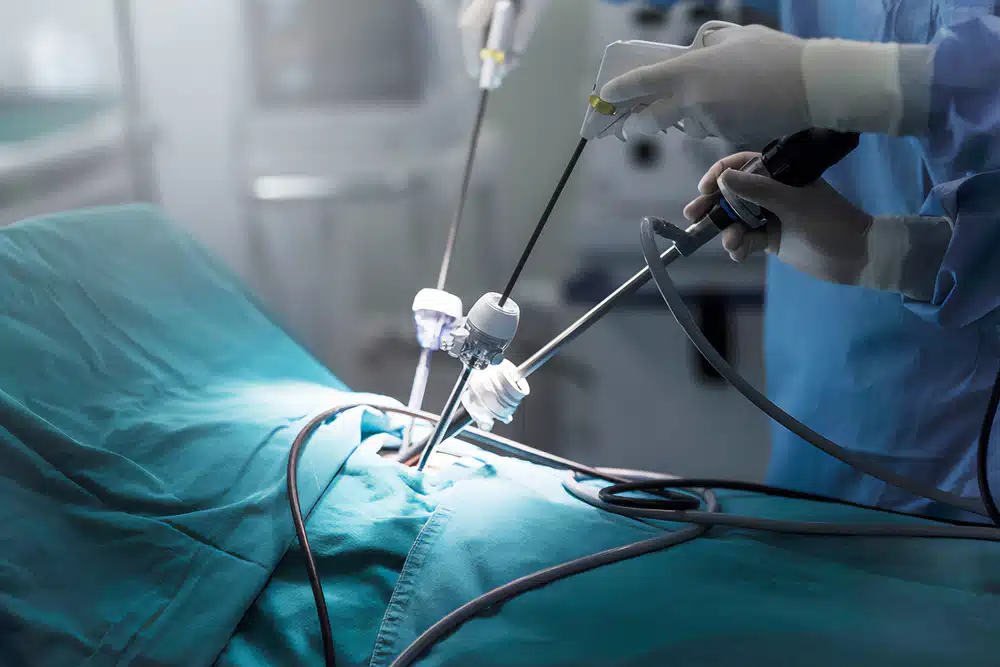
Risks and complications
Sleeve gastrectomy is a non-reversible surgical procedure. The rate of complications soon after surgery is very similar to traditional gastric bypass procedures.
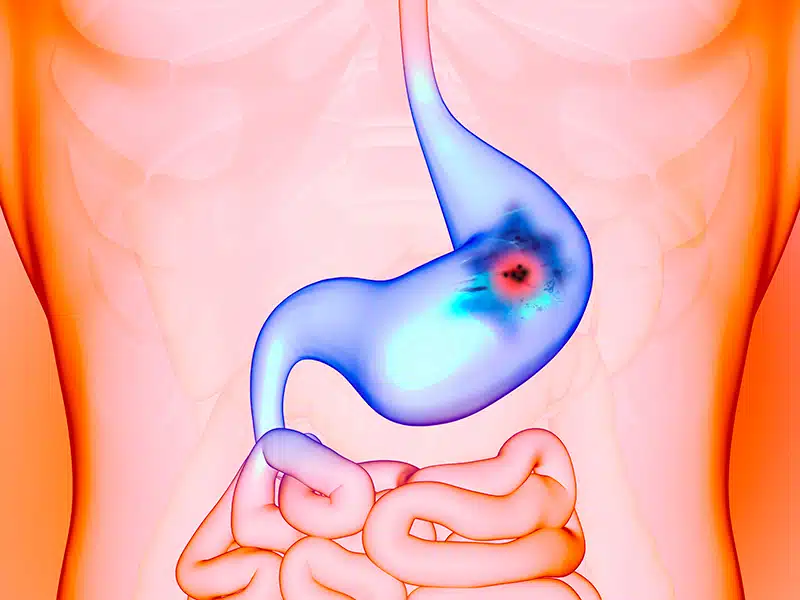
However, patients may deal with long-term deficiencies in nutrition after this surgery. Major complications are uncommon, with less than 1 out of every 200 patients needing to come back to the hospital for additional treatment. Still, any surgery has some risks. In this case, the risks may include:
- Infection: Bacteria getting into the body during surgery is also very possible, especially in patients who have weak immunity.
- Bleeding: Loss of blood during or after the surgery is common among those who take anticoagulant medications
- Hernias: Weak spots or tears in the incision area could lead to hernias in the long or short term.
- Heartburn: A burning feeling caused by stomach acid coming up the throat.
- Other risks: this may include severe acid reflux, narrowing of the sleeve, leaks from the staple line, and dumping syndrome, which occurs when food passes too fast through the digestive system, leading to nausea, vomiting, and diarrhea.
Do you want to avoid all these risks?? Get your free consultation now
Gastric Sleeve Surgery Costs
Gastric sleeve surgery is a major procedure that requires careful budgeting. The average gastric sleeve cost in Turkey is around 2500 US dollars in Turkey, while it may reach up to 15000 US dollars in the United States. Below is a table that provides an estimated cost for the procedure in different countries:
| United Kingdom | 6000-10000 US dollars |
| United States | 8000-15000 US dollars |
| Turkey | 2500-3000 US dollars |
| Australia | 5000-10000 US dollars |
| UAE | 5000-8000 US dollars |
| Mexico | 3000-4000 US dollars |
| Germany | 4500-6000 US dollars |
Worried about costs? Get in touch on WhatsApp to discuss affordable medical options
In any case, actual costs may be higher or lower depending on several factors. The base price typically covers the hospital facility fees, surgeon fees, anesthesia, pre-surgery testing, and some follow-up care after discharge. If you require a longer hospital stay, that will also increase the total bill.

Other common additional expenses include:
- Consultations with a dietitian or nutritionist to provide guidance on your eating plan. The initial meeting may cost 100 US dollars or more, with follow-up visits ranging from 70-100 US dollars.
- Prescription medications to manage pain and prevent complications like blood clots after surgery. These can cost between 50-100 US dollars without insurance coverage.
- Compression garments that you may need to wear during recovery to reduce swelling. Prices start at around 50 US dollars.
- Travel and lodging costs if you need to go far from home for your procedure.
Patient Stories and Testimonials
Here at Intentional Clinics, we receive thousands of patients from all around the world who seek safe and affordable gastric sleeve surgery. Many of these patients left comments, testimonies, and reports, and many are also famous figures and celebrities. Below are some examples of gastric sleeve success stories (we only used their initials for privacy reasons).
“Ah from where I should start talking about my surgery. Having gastric sleeve surgery was in fact one of the best decisions I’ve ever made. I lost 85 pounds in the first year and have successfully kept it off. Before that, I felt ashamed of my body. Now I feel confident and happier whenever I look in the mirror. My acid reflux and joint pain have also disappeared since the surgery, but it took more time than I first anticipated.”
Patient H.H (46 years old) from Kuwait
“Years of dieting was a complete waste of time. After contacting International Clinics, I realized that gastric sleeve surgery may help me take control of my health and stop the mess. I’ve lost many pounds till this point. I’m so grateful I found the solution I needed with gastric sleeve surgery. Oh man, I don’t like to praise anyone, but these clinics deserve some praising.”

Patient T.A (27 years old) from the United States
“I dislike speaking about my experience, but in general gastric sleeve surgery helped me lose a great deal of weight. Even better than weight loss is how much better I feel physically and mentally, but I need to warn other people about the diet they should follow after the surgery”
Patient R.Q (51 years old) from Japan
Gastric sleeve alternatives
Gastric sleeve isn’t the only game in town. There are other options for obesity surgery in Turkey for those who search for other quick, drastic weight loss options, such as gastric bypass and gastric band. Below is a comparison between gastric sleeve and some of these options.
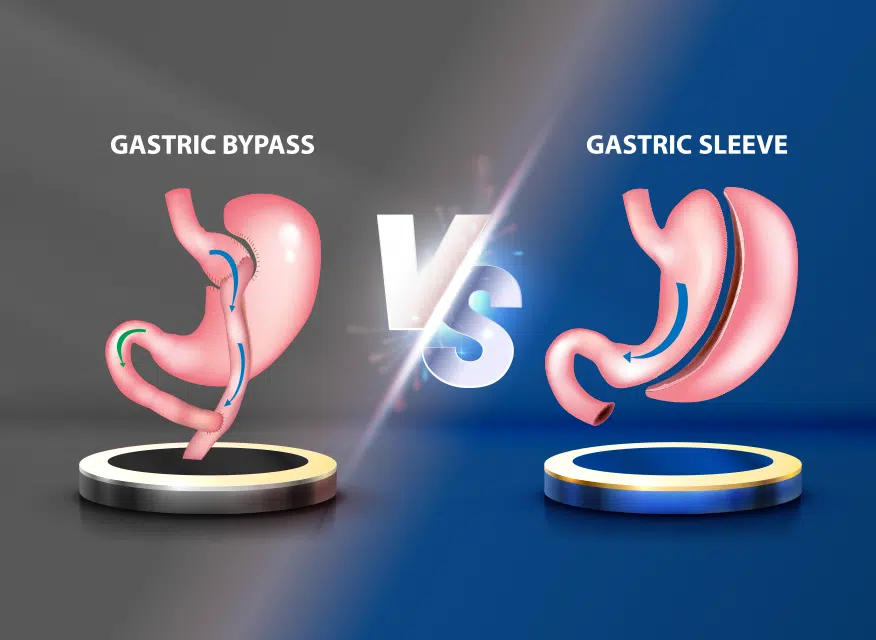
Gastric Sleeve vs. Gastric Bypass
Weight loss surgery usually implies two major procedures: gastric bypass and gastric sleeve. Gastric sleeve, also called sleeve gastrectomy, involves removing a large portion of the stomach, including the part that produces ghrelin, a hormone that stimulates appetite.
This procedure requires a hospital stay of two to three days and lifestyle changes afterward such as eating smaller. Over the first 12 to 18 months, gastric sleeve patients can expect to lose 60-80% of their excess weight.
On the other hand, gastric bypass creates a small pouch from the stomach which is then connected directly to the small intestine. As a result, food bypasses much of the stomach and the first section of the small intestine. Like gastric sleeve, gastric bypass requires a 2–3 days hospital stay and dietary changes.
However, gastric bypass has a long track record as decades of research have shown consistent weight loss results. In the first six months, gastric bypass patients see rapid weight loss and ultimately lose 60-80% of their excess weight.
Overall, gastric sleeve is a slightly less invasive procedure with a faster recovery time. However, gastric bypass has proven over time to be highly effective for significant weight loss. Both obesity surgeries cost in Turkey less than in the United States and the United Kingdom.
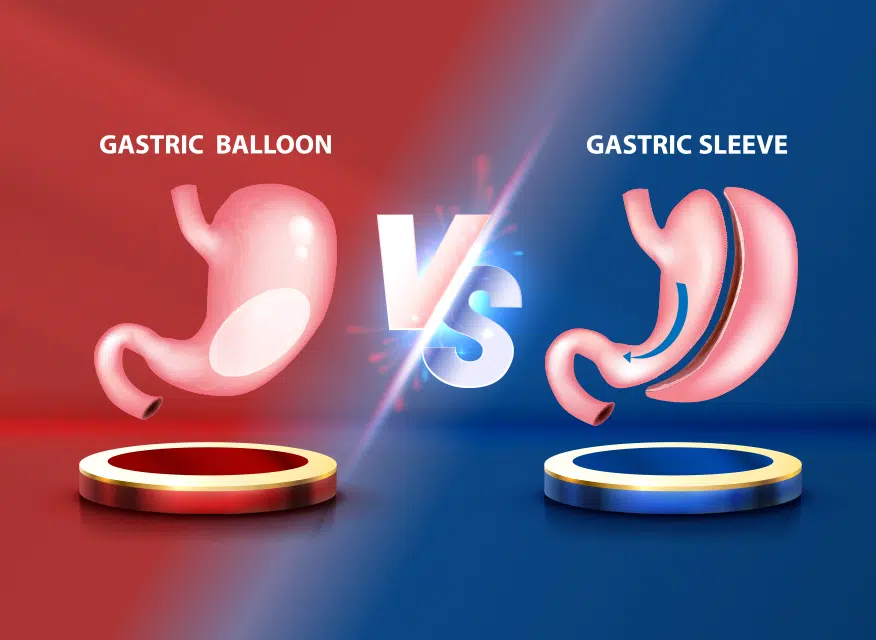
Gastric Sleeve vs. Gastric Balloon
The gastric balloon is a non-surgical, reversible procedure for weight loss. One or two balloons are inserted into the stomach through the mouth while the patient is lightly sedated.
The balloons remain in place for six months before being removed. During those six months, the balloons take up space in the stomach, creating a feeling of fullness with smaller portions of food. This helps patients develop healthier eating habits that promote ongoing weight loss even after balloon removal.
In comparison, the gastric sleeve is a procedure that “surgically” reduces stomach size by removing a large portion of the stomach. The smaller stomach size makes patients feel full faster and experience less hunger.
Both procedures are restrictive, meaning they reduce the amount of food that can be consumed at one time. They also decrease ghrelin, a hormone that stimulates appetite. As a result, patients feel less hungry.
Both the gastric balloon and gastric sleeve are safe, effective options for weight loss when combined with a healthy diet and exercise. However, the gastric sleeve typically promotes more significant weight loss than the gastric balloon.
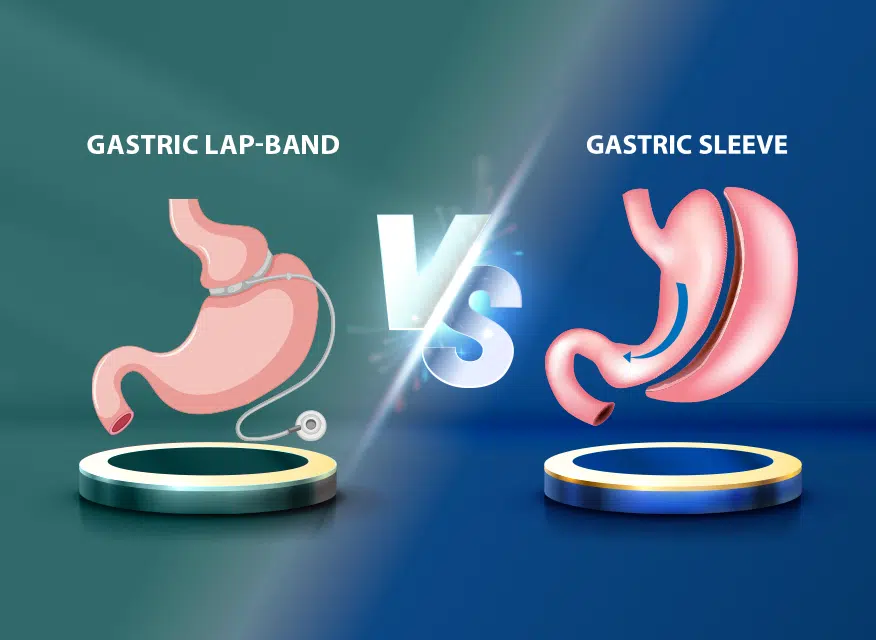
Gastric Sleeve vs. Lap-Band
Lap-band surgery is a weight loss procedure that involves placing an adjustable band around the top of the stomach.
This band narrows the stomach, limiting how much food can fit inside. The goal is simple: help patients feel full faster, so they eat less.
During lap-band surgery, a bariatric surgeon places the band around the stomach while the patient is under general anesthesia.
The surgery is usually done through a laparoscopic surgery, meaning the surgeon makes small incisions in the abdomen and inserts tiny tools with cameras to see inside.
Compared to gastric sleeve surgery, which removes part of the stomach, lap-band has lower body mass index (BMI) requirements.
However, gastric sleeve results in more weight loss and improvement of obesity-related diseases. One benefit of lap-band is that risks of surgery complications and vitamin deficiencies are lower than with gastric sleeve.
Current Statistics and Research
To get a better understanding of the gastric sleeve’s effectiveness, we must review facts and statistics related to this surgery from different angles.
Latest success rates
According to sources, the gastric sleeve procedure has a high success rate. In fact, many indicate that between 80-90% of gastric sleeve patients achieve their weight loss goals successfully.
A few analyses, however, have found the success rate of gastric sleeve surgery decreases over time. One 10-year study followed patients who had undergone sleeve gastrectomy and found that only 41% maintained at least 50% of their excess weight loss after a decade.
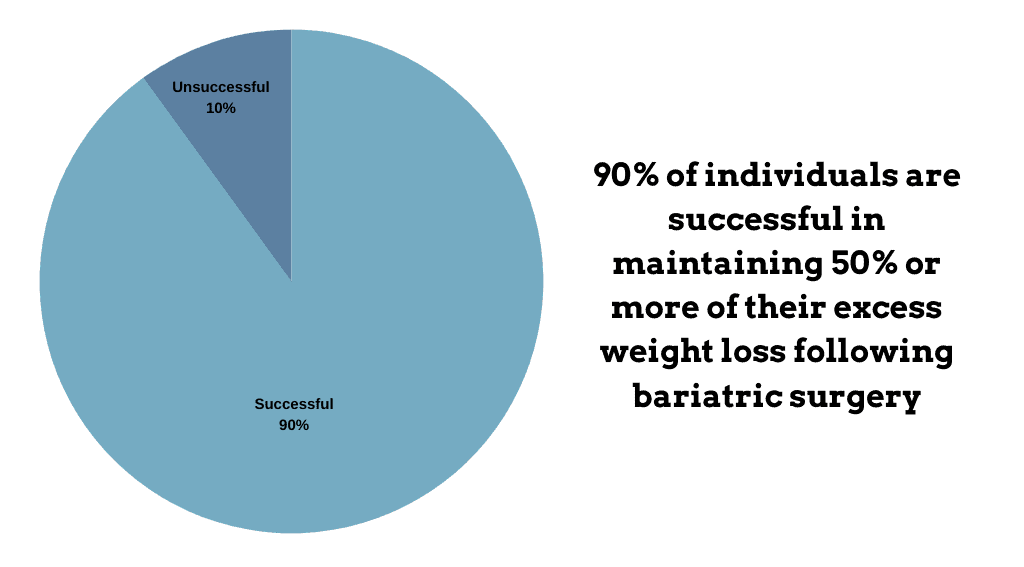
Complication rates
Complications from laparoscopic sleeve gastrectomy (LSG) can be categorized as early or late onset. Early complications occur within 30 days of surgery, while late complications happen more than 30 days post-surgery.
The risk of complications varies between patients depending on individual factors. Surgeons can provide personalized risk assessments before surgery. Overall, statistics show about 5% of LSG patients experience some type of complication. The risk of fatal complications during surgery is very low, around 0.2%.

Weight loss outcomes
The gastric sleeve procedure typically leads to significant weight loss for patients. On average, research shows sleeve gastrectomy patients lose 25-35% of their total starting body weight. When looking specifically at excess body weight, the average weight loss is 50-70%.
Excess body weight refers to the amount of weight a person carries above their medically ideal weight for their height and body frame. So, for an individual with 100 pounds of excess weight, they could potentially lose 50-70 pounds through sleeve gastrectomy.
However, weight loss results vary on an individual basis. Some gastric sleeve patients lose a little less than the average amount, while others succeed in losing more than 70% of their excess body weight.
Frequently Asked Questions (FAQs)
With experienced surgeons, you can expect manageable pain for 1-2 days after surgery. Pain medication will keep you comfortable. You can take medication only if needed.
The surgery isn’t the hardest part. The lifelong diet changes after are more challenging. Gastric sleeve surgery works by reducing stomach size. This makes overeating difficult.
Over time, sleeve gastrectomy has fewer risks of death and problems than gastric bypass. However, patients may need more follow-up procedures.
The stomach with a sleeve can expand gradually, which can lead to failure. Besides, the body and mind could adapt to the surgical changes, leading to the ineffectiveness of the whole procedure.
Most often, if a weight loss surgery isn’t successful, it’s usually because the patient resumed their previous eating habits. In some instances, the bariatric surgery might not have worked as expected and might require further attention.
Conclusion
While sleeve gastrectomy surgery reduces stomach size to limit food intake, the amount and pace of weight loss depend on the patient’s commitment to lifestyle changes.
The smaller stomach helps patients feel fuller faster and control hunger. However, adopting healthy eating habits within the recommended calorie intake range is crucial for weight loss success.
It’s common to reach a plateau at some point during the weight loss journey. When this happens, patients may need to increase their exercise duration, vary workout types, and increase intensity. Staying motivated to maintain new habits is key.
International Clinics has provided gastric sleeve to thousands of international patients. Our surgeons have dealt with numerous cases and helped many patients achieve tangible weight loss. You can contact us now for more information.
